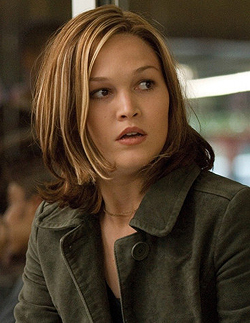In short, he is indestructible.
Yes, of course, he had that nasty amnesia
and his memories resurface conveniently little by little, so as to put together
the plot of another film. But the more he remembers, the less the man he was
before emerges: the elusive David Webb.
What I notice as we go on with the films is the
disappearance of any empathy in the character, which gradually dehumanises
himself as he moves faster and faster from one to another breathtaking action
scene.
In “The Bourne Identity”
I wondered who he was, just like he did; I felt concern for him and the woman
who had decided to trust him and help him. Only some years later, when I read
the book by Robert Ludlum, to which it was inspired, I learned this is the
only film in the series to have some connection with the novels. And you
see it, since Bourne in the first film is a character with a certain depth.
Although he instinctively behaves like a war machine, he is full of doubts
and fears, like his literary alter ego. The plot is a bit different,
because the context in which it takes place is far ahead in time and this
required some adaptation. Furthermore, the film medium imposes a certain
reduction and simplification of the novel, which, instead, is extremely
intricate.
But, since the moment it detaches from the work
of Ludlum (which, I must admit, inspired my action thriller “Kindred Intentions”),
the one which suffer most from the consequences is precisely Bourne’s
character. What characterises this work disappears: this character being a
bit crazy, his wavering between the normal personality of Webb and the one
thirsty for revenge of Bourne, his being fallible.
In fact, Bourne in films rarely makes a
mistake. He is always a step ahead of others. And this characteristic is
accentuated by the deletion of any bonds with other people, starting
from Marie (played by the talented Franka Potente),
even if what moves him is, in theory at least, a desire for revenge as well as
survival, combined with the absence of any fear of death.
In this context, the same plots are repeated.
Someone wants to kill him, usually someone from the CIA, whether this is
an official and approved decision or not. They unleash against him the most
ruthless assets (how much I like this term for a hired assassin!). So
bad. They kill anyone who stands in their way, but never once they manage to
get rid of Bourne.
On the other hand, when he flees in a car or
motorcycle with someone, this someone ends up getting the bullet meant for
him.
And you don’t know how that has bothered me
when I understood that it would happen again in this last film. I was watching
the long chase in Athens India
“Jason Bourne”
is a repetition of all these elements, held together by a secret to be
discovered regarding the protagonist’s father, which is the only new
element. The rest is action, action, and more action.
Not that I’m complaining. I love action.
During the film I felt glued to my seat to
follow the swirling succession of events and continuous cutting away of the
camera, accompanied by the certainty that Bourne would always prevail.
The fun part was to find out how he would succeed, what they would
invent for him to overcome all obstacles, what other famous city he would
put on fire and how he still would outwit the others.
And then there are the car chases. It
doesn’t matter if his opponent drives a Humvee, blasting the other vehicles as
if they were bowling pins, and Bourne has a normal car. The latter will be
bruised, but will always be fast, indeed, even faster than before. He,
who can do everything, will drive without stopping, dodging the cars that come
his way, because he certainly cannot help but enter a trafficked road
against the flow. It doesn’t matter if Bourne is injured and not fastening his
seat belt. When the car overturns and he comes out limping, he will still be
able to fight barehanded with his opponent. He will risk succumbing, but
eventually a last-gasp effort will save him.
Let’s not forget his cunning and audacity.
Bourne watches from a distance (but not too far) that one CIA character
that basically doesn’t consider him a threat, and he anticipates their moves.
It had already happened with the one played by Joan Allen
in “The
Bourne Supremacy” and “The Bourne Ultimatum”,
and now it’s time for Alicia Vikander,
whom, although being a good actress and despite I have much appreciated her in
other films, I just cannot like in this film because of her selfishness.
But do not worry: Bourne has understood her well. He will prove it in
the end.
In short, this film has all it takes to please
me, but I liked it less than the first and the third one, and I don’t
know if more or less then the second one. Maybe it depends on the progressive
chillness shown by the protagonist. Or perhaps simply because I didn’t
accept how Nicky Parsons, played by Julia Stiles,
who is one of my favourite actresses, is
treated. Lately she is increasingly relegated to secondary roles in films
and I was hoping that after “The Bourne Ultimatum”, where she was one of the main characters,
the latter would be repeated in “Jason Bourne”.
Well, I will suck it up. And, if there is a
sequel (the open ending would suggest so), I’ll have to see that too.
After all, I cannot miss a movie with Matt Damon.




No comments:
Post a Comment